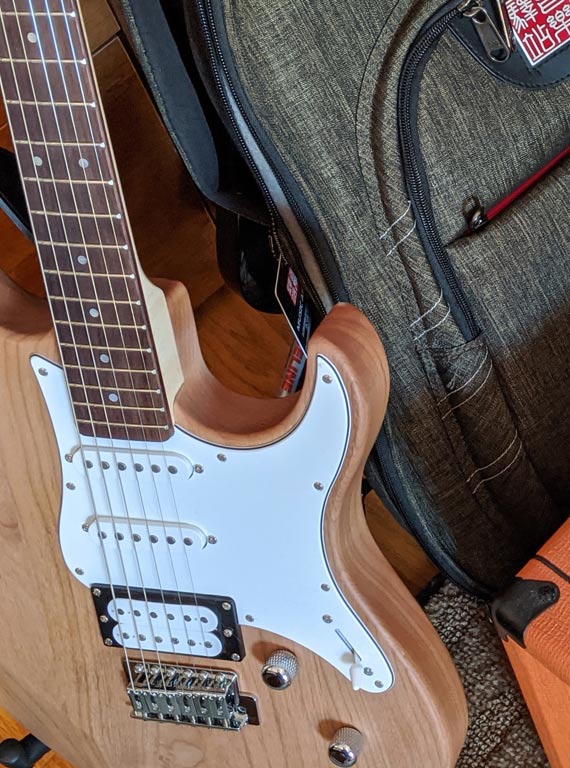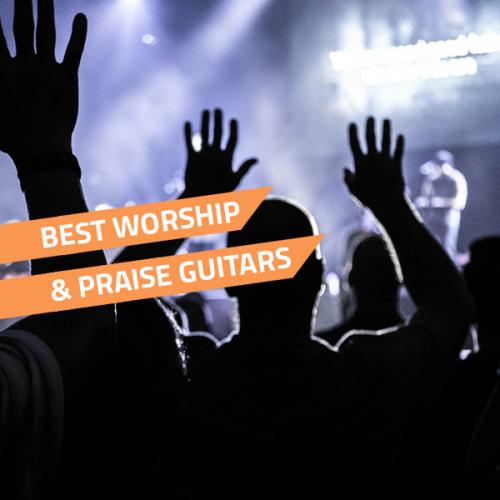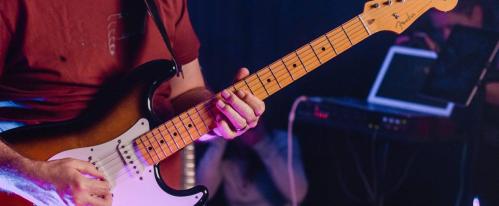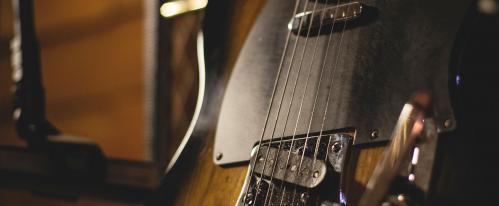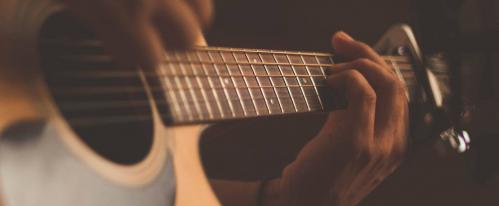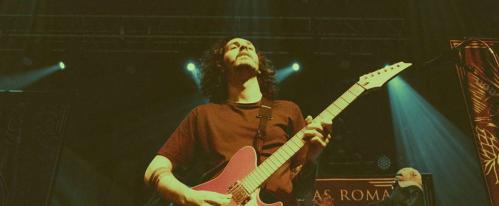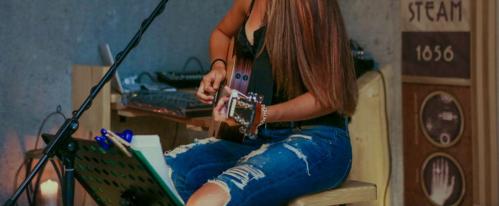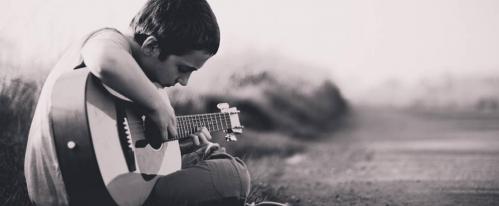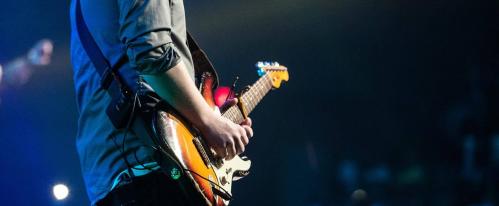READ OUR ELECTRIC GUITAR BUYING GUIDE AS WE ANSWER THE QUESTION "WHAT ELECTRIC GUITAR SHOULD I BUY?"
If you're shopping for your first electric guitar, we recommend taking a few minutes to read our handy electric guitar buying guide. We previously wrote about how to choose your first acoustic guitar. Now, it's time to have a look at electric guitars. We discuss a few key questions including;
- What's the difference between a solid body and a semi-acoustic guitar?
- Are starter packs always the best option?
Well, PMT is here to help you with these and many other issues!
NO TIME? WATCH OUR ELECTRIC GUITAR BUYING GUIDE VIDEO
TOP 5 THINGS TO CONSIDER BEFORE BUYING YOUR FIRST GUITAR:
Here are our top 5 tips on choosing your first electric guitar. Choosing your first electric guitar should be fun and a memorable experience as everyone remembers their first electric guitar, so be sure to take your time and enjoy yourself! Remember, there's no right or wrong answer here - but these tips will help serve as a little guide to help you choose a guitar that you'll love playing for many years.
1) CHOOSE A GUITAR LIKE YOUR IDOLS
Everyone wants a guitar that makes them go "Wow!", and it changes from person to person, of course. Owning an instrument that looks like the one that your idol plays can make a difference to your experience. After all, most people decide to play a guitar because they've been inspired by a particular band or guitarist.
So we think it's important that someone's first guitar should be an instrument that will inspire the player. And few things can inspire a person more than someone they admire!
A good starting point, then, would be to consider what instrument your favourite artist plays. Not just because it'd be great to play something that looks similar, but also for the sound. Different guitars can sound wildly different, and if your favourite guitarist is Jimi Hendrix, for instance, you'd probably be happier choosing a guitar along the lines that he played. In addition, if your favourite guitarist was Jimmy Page, you'd likely be happier playing a guitar similar to what he uses.
(For the record: Jimmy Page = Plays A Gibson Les Paul , Jimi Hendrix = Plays A Fender Stratocaster).
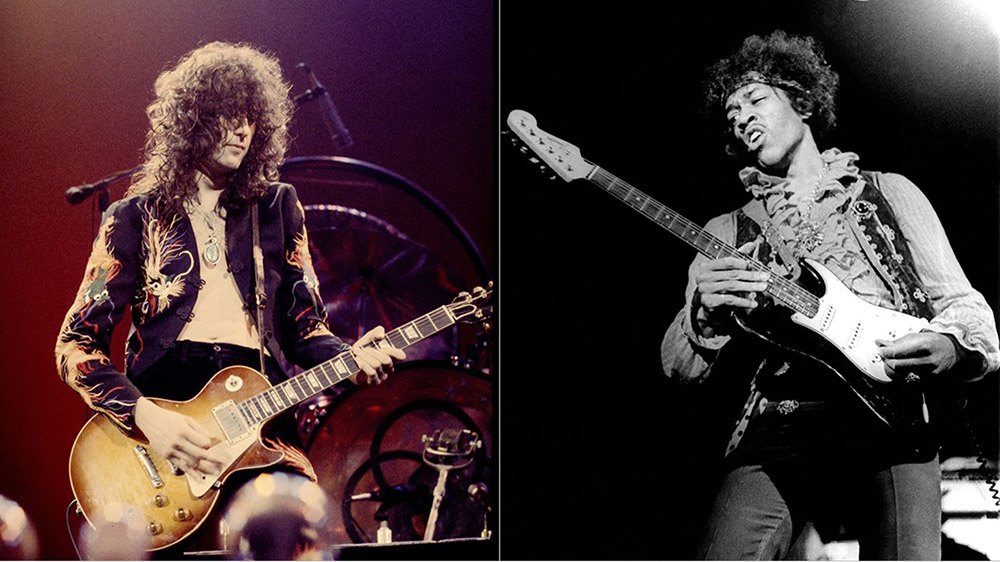
But even on a superficial level, the look of the guitar is very important - let's say for example you're buying your son or daughter a guitar this Christmas, and their musical idol is Kurt Cobain. Well, then they'd be much more pleased to get a Fender Jaguar guitar (similar to Cobain's) than a Fender Telecaster (a guitar model not really associated with Kurt).
However, you can be sure a Keith Richards or Bruce Springsteen fan would prefer a Telecaster rather than a Jaguar, for the same reasons. Fortunately, you don't have to spend a fortune to get a similar guitar to your musical idols. If you're on a budget then the Squier Jaguar guitars are great affordable options for the Cobain fans. And the Epiphone Les Paul guitars are ideal for the likes of the Jimmy Page fans out there.
You can easily find which gear most famous guitarists have played by searching online, or even by consulting our guitar experts at one of our PMT stores or by phone. In fact, many brands recognize the appeal of popular artists and now the market has a wealth of different Signature Electric Guitars, custom made to appeal to fans of guitarists such as Jimi Hendrix, Kurt Cobain, Malcolm Young, Albert Hammond Jr., Joe Satriani, Steve Vai and many others.
2) PICK A GUITAR THAT SUITS YOUR MUSICAL TASTES
If you don't have a favourite guitar hero, then the next best thing is to consider what kind of music you (or the person you're buying a guitar for) like the most. We must stress that this is just a very general rule of thumb, to help a beginner to choose a guitar. You may like Blues, but want a shred style guitar - it's all up to you! For example, the likes of Jim Root uses classic Fender style guitars for his band Slipknot - something that blows our mind!
Most experienced players will play whatever instrument they fancy anyway, as most guitars can sound fine in whatever musical style you choose to play, you just need to make sure you're using the right pickups. In fact, many guitarists often like collecting instruments and have a few different guitars so they can enjoy all the different tones and sounds they offer.
We won't go into technical details about the difference between all the guitar models out there because it's not that relevant for someone who's just starting out, as after all this is a general overview in our electric guitar buying guide. We'll just round up a few of the main styles to give you a general overview.
The Stratocaster
The Stratocaster (or simply "Strat") is the most popular type of electric guitar, used in many different styles of music, from blues to pop, from indie to heavy metal! All 'Strat' or 'S' style guitars are derived from the Fender Stratocaster.
This is a versatile guitar that suits most styles.
We recommend the awesome Antiquity Guitars ST range for beginners and those on a budget. They're the best playing electric guitars for the money, with an array of classic tones at your fingertips.
Squier Stratocasters are a solid option - the Squier Classic Vibe Stratocasters are the best value-for-money Strats right now, good for beginners but suitable even for experienced players. You can also check out the whole Squier Classic Vibe range.
The Yamaha Pacifica is another great value guitar, as good as anything twice its price.
If you're on a budget but you don't want a beginner style guitar, the Fender Vintera Series is still quite affordable, and offers pro level playability at budget-friendly prices!
Guitar tip: if you're playing punk or heavy metal, choose a Stratocaster HSS guitar, which comes with a humbucker pickup in the bridge position, for added power.
Pictured: Antiquity ST1 Electric Guitar
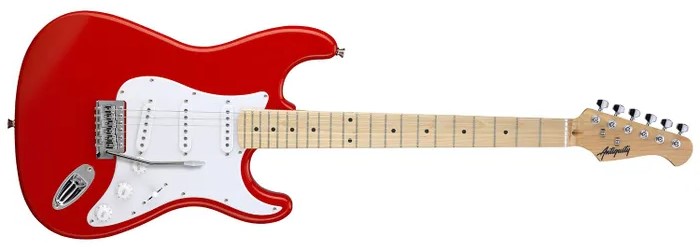
The Telecaster
The Telecaster, or "Tele", is a very traditional guitar, and great for traditional blues and rock'n'roll - after all, it's one of the earliest guitar models ever manufactured, predating the Strat.
This model is also very popular with indie bands, and today it's one of the main choices for younger players - it's seemingly everywhere!
Once again, Antiquity and Squier Telecasters provide the best affordable models in that particular style, and are perfect for beginners, but something like the Squier Classic Vibe Series is definitely good enough even for more experienced players.
If you can stretch your budget, an authentic Fender Telecaster is a better instrument, which will last a lifetime - and some models are reasonably priced, such as the Fender American Performer models.
Pictured: Antiquity TL1 Electric Guitar
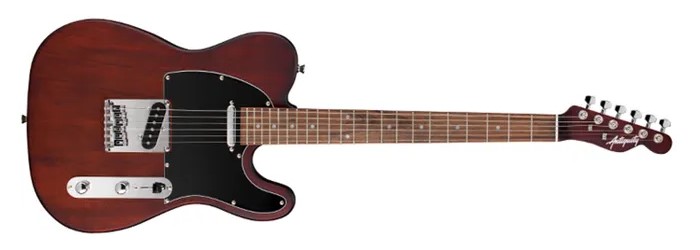
LES PAUL-style: Classic Rock, Blues, Heavy Rock, Punk
Next up in our electric guitar buying guide is the Les Paul. Great for blues, rock'n'roll, and heavy rock. Think Led Zeppelin, Guns'N'Roses, or Aerosmith.
No other guitar model has as much "mojo". Antiquity and Epiphone makes the best affordable Les Paul guitars around, but nothing beats an authentic Gibson Les Paul. The Gibson versions are often expensive, but very desirable and totally worth the extra investment.
Some of the best current models include the Gibson Original & Gibson Modern collections.
A Gibson Les Paul or Les Paul style guitar will often feature a set of humbucker style pickups that provide a fat, heavy sound. These pickups are often used by hard rock style guitarists as the bigger sound is more desirable than guitars with single coils - like a strat style.
Pictured: Antiquity LS1 Electric Guitar
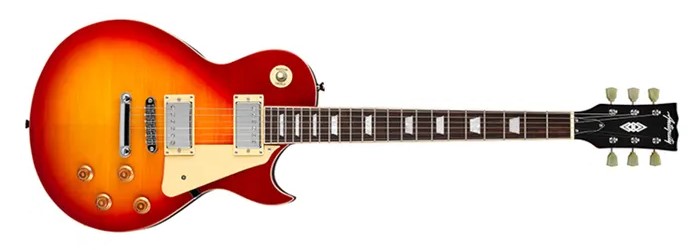
SG-style: Classic Rock, Blues, Heavy Rock, Punk
SG guitars are usually popular with heavy-rock players - they're light, slim and offer great access to the upper frets - which is ideal for soloing and shredding.
Some acts who used one include Black Sabbath, AC/DC, Cream-era Clapton.
The Epiphone SG models are quite affordable, and great guitars for the price. The Ibanez RG guitars and most PRS models are different than the SG but also popular with the fast & loud brigade.
PRS makes some really expensive models, but the affordable PRS SE Standard 24 looks and sound totally awesome. Another great option if you want to rock out, is the Gretsch G5655T-CB, which bears a shape familiar to those who like AC/DC and Malcolm Young, who played a similar-style Gretsch.
Our favourites come from Antiquity - as pictured below!
However, the original choice is of course to go for a proper Gibson SG, available in many different finishes and pickup configurations.
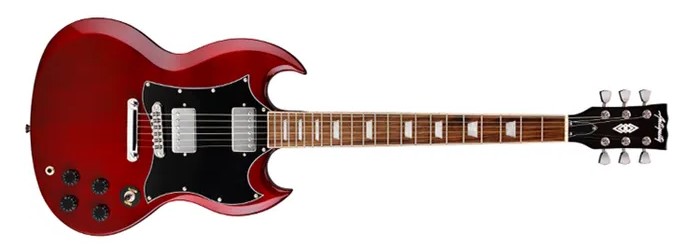
JAGUAR / JAZZMASTER -style: Alt-Rock, Indie, Surf Music
No electric guitar buying guide would be complete without a Jazzmaster/Jaguar and offset style guitars. These models are popular with fans of more alternative music, like Nirvana, Radiohead or Sonic Youth. Shoegaze bands, emo bands and more have relied on these instruments.
There are some key differences between the Jazzmaster and Jaguar guitars which we've discussed here. But overall, the sound is similar in terms of stabby, jangly sounds that really come to life with some distortion added.
In the sixties they were commonly used by 'Surf Music' bands including the Beach Boys, and later adopted by punk and new wave acts such as Television and Elvis Costello, before finally becoming a classic (and almost exclusively) "Alt-Rock" instrument.
The Squier Jazzmaster is by far one of the most affordable and most popular models right now for beginners. Check out Fender Jazzmaster guitars and the Fender Jaguar and see which one you like best for your style.
Antiquity also make a range of offset guitars which give you the same sounds you'd expect from a more expensive instrument - as pictured below.
Pictured: Antiquity AQJZ Guitar
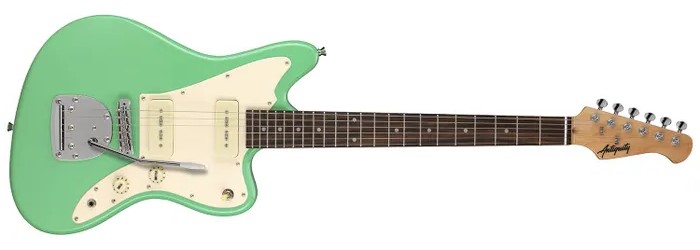
SEMI-ACOUSTIC-style: Blues, Jazz, Rock'n'Roll
These guitars are great for jazz and blues, but can be used for rock'n'roll too: from The Beatles to Oasis, Foo Fighters and Arctic Monkeys, many rock bands have used this type of guitar. Gretsch semi-acoustics are a popular choice for 50's-style rockabilly and rock'n'roll, whereas Ibanez models are considered some of the best for Jazz.
Talking about The Beatles... owning a Rickenbacker is a dream of most fans who also play guitar. These guitars are unlike any other, and they look and sound superb.
If in doubt, Epiphone semi-acoustics are always a great choice: with their affordable prices and good quality, they are equally suitable to pros and beginners alike.
Antiquity semi-acoustic models are some of the most-loved here at PMT - they're versatile and infinitely playable for guitarists of all levels.
In short: The most desirable semi-acoustics are perhaps the Rickenbackers (as used by The Beatles) and of course, any Gibson ES.
The best buy right now is the Epiphone ES-335 Dot . Fans of Cream-era Eric Clapton, Noel Gallagher, and, well, Back To The Future's Marty McFly will love that classic look, for a very affordable price!
Pictured: Antiquity AQ35 Electric Guitars
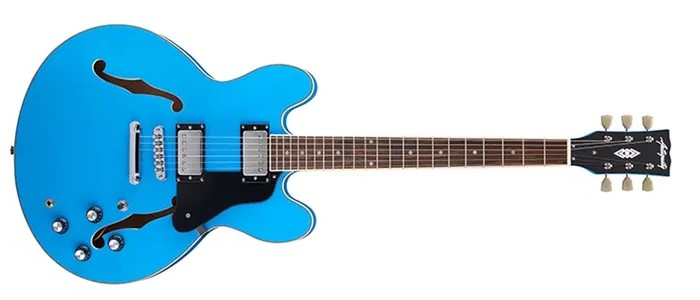
3) SEMI-ACOUSTIC VS. SOLID BODY GUITARS: WHICH ONE TO CHOOSE?
Semi-Acoustic electric guitars are quite different than the other models mentioned (Strats, Teles, etc.) because they have bigger, hollow or semi-hollow bodies. This means they are lighter, and produce a richer, more "acoustic" tone than the other models mentioned above.
On the other hand, it also means they are not usually suitable for heavy-metal, because they tend to feedback more when played at really loud volumes. The other guitars we mentioned are all solid body guitars, which means their main body is a solid block of wood.
Depending on the design style and quality of wood, they can be heavier or lighter. Les Paul guitars are known for being heavier than any other, though these days many are made with weight-relief designs.
4) ARE YOU BUYING THE GUITAR FOR A CHILD?
If you're buying the guitar for a small child (say, ten-year-old or younger) you should buy a 3/4 sized electric guitar, which is more suitable for players with smaller hands. A child can play a full-size guitar, but it can be a little difficult if they're just starting out and around primary school age, so it's not really recommended, because it could put some kids off!
If you're buying the guitar for a teen, though we advise a full-size guitar, that way you don't have to upgrade. Want a bit more info on guitar sizes? Check out Dagans handy video guide to guitar sizes below:
5) SHOULD YOU BUY A STARTER PACK?
Electric Guitar Starter packs are very convenient, as they come with literally everything the future guitar hero will need to get started, which makes these packs the perfect choice if you're looking for a cheap, beginners electric guitar.
These days you can find many packs that offer outstanding quality and value for money, and they also look great as a gift, be it at Christmas or for birthdays, because everything comes in a big, nice box!
The range of Epiphone Starter Packs are some of the best value guitar packages around, and available in a range of different colour options, all of which include a tuner, cable, case and practice amp.
Perhaps the only downside of guitar packs is that you'll be more limited in your choices. If you want something of better quality, or that suits you more, the best option is still to buy everything separately. You can choose a bigger or a smaller amp, coloured leads, etc.
Our favourite starter bundles come from Antiquity - check them out here:
AND REMEMBER: PRACTICE IS IMPORTANT!
Of course, once you get a guitar it's important to practice regularly. But sometimes just playing on your own can be frustrating.
That's why one of the most popular products we sell is the Looper Pedal. With a looper pedal, you can play a few chords whilst the pedal records what you're doing.
You can then jam along to what you've played. For the beginner, it's the best way to learn how it feels like jamming with another guitarist!
Pictured: Big Top Ringmaster Looper
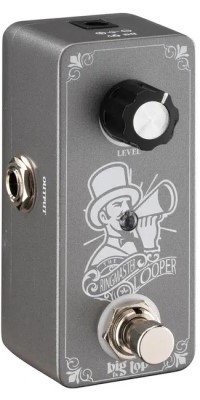
WHAT OTHER GUITAR ACCESSORIES DO YOU NEED TO BUY?
As we mentioned on our Acoustic Guitar Buying Guide, those who choose to go for an acoustic guitar got it easy - the acoustic guitar is an instrument that can be played straight out of the box!
Not so with the Electric Guitar. The sound it produces when unplugged is too quiet to be of any use - it's meant to be plugged into a guitar amplifier, to amplify the sound captured by its pickups. But that's not all, so here's a list of all essential accessories you need to own if you buy an electric guitar that doesn't come in a starter pack:
1) Guitar Amplifier
Like guitars, every amp sounds different than the others, and often some models are more suitable for some styles than others. The most important thing to bear in mind is that when buying a beginners guitar amp, it doesn't need to be too loud, as it's unlikely a novice player will be playing gigs anytime soon.
That's why most guitar starter packs only come with a small practice amp, usually no louder than 15-watts.
Some of the best models for beginners or guitarists with limited space/ budget: the Fender Mustang LT50 Guitar Amp and the Blackstar ID:Core Beam Bluetooth Guitar Amp in Red are compact and versatile. An honourable mention also goes to the Orange Crush Mini - it has built-in overdrive and a tuner and sounds pretty good! Even more experienced guitarists can find uses for this amp - as a recording amp, to jam at home or simply pack in the luggage when going on holiday!
Our top guitar amp pick though comes from Antiquity. The ATG-15R offers a clean and a drive channel with a spring reverb that sounds especially lush, giving you access to an endlessly inspiring palette of tones that are both practical and versatile for beginners and seasoned players alike.
2) GUITAR FX PEDALS
Most modern guitarists use a combination of different FX Pedals. The most traditional effects are Fuzz, Distortion, and Wah-Wah, as pioneered by guitarists such as Jimi Hendrix and Jimmy Page.
Prices vary greatly, and the pros usually opt for the more high-end brands, such as Strymon and the industry standard Boss FX Pedals. For beginners or guitarists on a budget, one of the best options are the new Big Top FX.
They're small, very affordable and sound great! If you own a lot of FX pedals, having your own power supply, such as the Voodoo Lab Pedal Power 2 Plus is quite important - it may seem like a big investment at first, but can save you money on the long run, and prevent your pedals from running out of juice mid-performance!
You can read our beginners guide to effects pedals HERE.
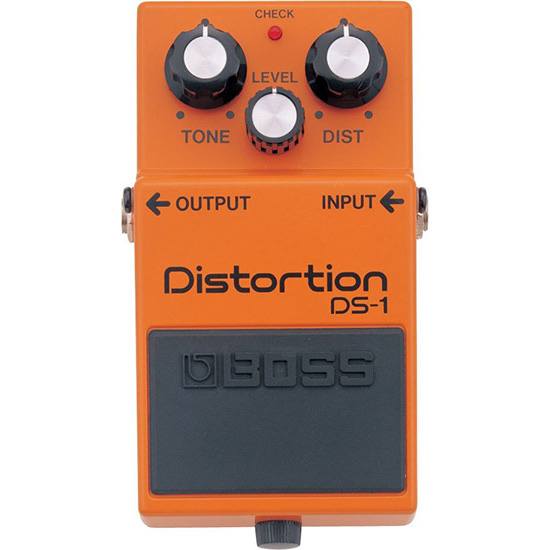
3) GUITAR CABLE, PICKS, STRAP, STRINGS & TUNER
- GUITAR LEAD - We recommend a 3m guitar lead, as a beginner won't be playing gigs so doesn't need anything longer than that. Just choose one to suit your budget, but usually you'll find quality cables for under £10.
- GUITAR PICKS - Most guitarists use a guitar pick or plectrum (also called "plectrum") when playing guitar. They come in a wide range of sizes/thickness, but for a beginner any pack of medium picks will do nicely.
- GUITAR STRAP - Unless the player plans to sit down with his/her guitar all the time, we'd recommend a guitar strap as one of your essential accessories! They come in a variety of designs, simply pick one that suits your tastes and budget! The leather straps are much more expensive than the nylon ones, but usually look much better and can be great as part of a gift!
- GUITAR STRINGS - Guitarists always need a couple of packs of spare strings, and perhaps a beginner needs them more than most, so getting some is very important! There is a great variety of choice, as usual, but for a beginner we'd recommend a light set of guitar strings, with gauges from 0.009 -0.042mm. Thicker strings can produce a more powerful sound with greater sustain, and many guitarists prefer then, but lighter strings will feel softer to play, and that's better for someone who's just starting out, as they won't hurt the fingers as much.
- GUITAR TUNER - A good guitar tuner is the one essential accessories no beginner can do without! If your guitar is not in tune, it'll be quite hard to learn how to play it, after all! There are many tuners to choose from, but for the beginner we'd recommend the TourTech TTA-T01 Colour Screen Clip-On Tuner, because they are cheap and can be also used for acoustic guitars.
If the electric guitar player already owns a few pedals, a good option is the Big Top Chromatic Tuner, which can just stay plugged in chain with other effects, on the floor, at all times.
For live performers, a tuner pedal is also the best option.
You can read our best guitar tuner pedals blog here.
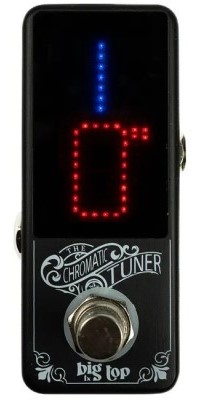
The accessories we mentioned above in our electric guitar buying guide are the essential ones, but if your budget can include more, we'd really recommend a Guitar Case or, at the very least, a Gig Bag (which always comes as part of any guitar starter pack!) A guitar stand or wall hanger would be helpful, too. Finally, have a look at our Guitar Care & Cleaning section.
If your budget allows you to include any guitar care product, by all means, do it! After all - now that you went all this trouble to find your perfect guitar, it would be a shame not to make sure it always looks (and sounds!) its best! After all, a guitar is not just for Christmas... it can be a friend for life!
Thanks for reading our electric guitar buying guide!
Updated for 2023

